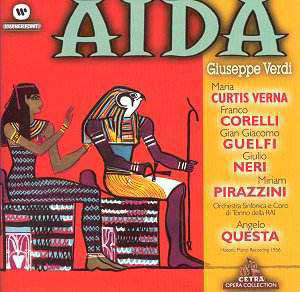The series of reissues of the Cetra complete sets from
the 1950s continues. The latest instalment is the second of the two
Aidas the company sent forth almost a half-century ago (the earlier
set, with Caterina Mancini and Mario Filippeschi - and crowned by Giulietta
Simionato's grand Amneris - was reissued two years ago {Warner Fonit
8573 83010-2}). The current resuscitation will undoubtedly find its
primary justification, for most collectors, in the Radames of the young
Franco Corelli. True he recorded the part again just ten years later
for EMI, and with as starry a line-up of artists as the 1960s could
provide. But this older Cetra performance comes to us in 2002 as the
first complete recording by a now legendary and well-loved artist.
But it would be ungallant and, in fact, unjust, to
ignore the other singers in the production and, in particular, the ladies.
Mary Curtis-Verna of Salem, Massachusetts, USA is not an artist well-remembered
these days but she had a long and honorable career, first in Italy and
then for a decade at the New York Metropolitan (her other Cetra operas
include Un Ballo in Maschera, already amongst the Warner Fonit
reissues and, only just recently reissued, Don Giovanni, the
latter with a hair-raisingly unidiomatic and fascinating Elvira from
the great Adriana, Minnie, and Nedda of the series, Carla Gavazzi!).
Here, in her prime, she offers an idiomatic, sincere, and wholly committed
account of the tremendously challenging title role. Her voice, basically
attractive and warm, and certainly of sufficient size to fill the requirements
of the part, suffers to a degree from a certain sameness, even dullness
of timbre. You can hear her working to lighten and brighten the sound
at the top of her range; she's often successful but the effort is not
entirely concealed. Still, she's a fine artist who has all the notes
and all the style and today would be in great demand in important theatres.
She did not make many recordings (though they include an earlier Aida,
for the Remington label, which boasts Ettore Bastianini as Amonasro
and the tremendous Oralia Dominguez as Amneris - wouldn't we like to
see THAT on a CD, though I suspect that the original tapes are long-gone);
for older American listeners this recording will provide a welcome souvenir
of many evenings at the Met when she and Corelli were partnered in Adriana
Lecouvreur, Don Carlo and other operas.
Miriam Pirazzini is a wonderful Amneris, rich and vibrant
in tone, feasting on the words, furiously imperious when required, and
capable vocally of all that the role requires save occasional momentary
strain in the very highest tessitura. Only belonging to a generation
that boasted Simionato, Barbieri, Cossotto, Dominguez, and Stignani
prevented her from achieving a more illustrious reputation.
Gian Giacomo Guelfi had a huge instrument. On record
it sometimes comes over as rather lugubrious in quality but there is
no doubting his authority as Amonasro. Giulio Neri's black and cavernous
sound was invented for Ramfis and he suffers only in comparison to his
younger self in the earlier Cetra Aida mentioned above.
And what of our star tenor? This is Corelli "prima
maniera," before he smoothed out somewhat the strong vibrancy in his
voice that was perhaps a result of his studies with Lauri-Volpi. Here
the high notes peal with "squillo" and the tenor takes care to repair
Verdi's too-parsimonious way with high notes by doubling all those of
Aida in the Triumphal scene! A typical, which is only to say
irresistible, Corelli performance!
Questa provides unobtrusive and thoroughly stylish
conducting. The orchestra, in the manner of 1950s mono recording, is
a bit too much in the background (the better to revel in the voices,
I hear you say?) but never mind. The recording provides a window onto
an era when not too much trouble could assemble a cast like this for
Aida and it could be, and often was, taken for granted. No more:
it has been some time now since that was the case.
The booklet offers an encomium to Corelli, some nice
pictures of the artists, and an Italian-only libretto.
Calvin Goodwin


![]() See
what else is on offer
See
what else is on offer 